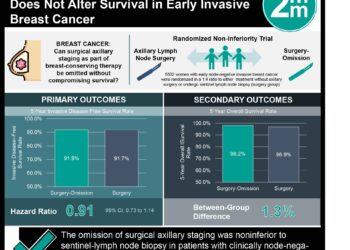[Physician Comment] Screening mammography linked to overdiagnosis; may have lesser impact on mortality than thought
Image: PD
Study Author, Dr. Welch, talks to 2 Minute Medicine: Professor of Medicine and Community and Family Medicine, Dartmouth Medical School; Co-Director of the White River Junction Outcomes Group
 “In a nutshell, our work shows that the benefit of screening mammography is likely smaller, and the harm of overdiagnosis likely larger, than has been previously recognized. But don’t believe me, read the article. Its not rocket science (or some inpenetrable computer model) – its federal data with a little algebra thrown in.
“In a nutshell, our work shows that the benefit of screening mammography is likely smaller, and the harm of overdiagnosis likely larger, than has been previously recognized. But don’t believe me, read the article. Its not rocket science (or some inpenetrable computer model) – its federal data with a little algebra thrown in.
But there’s a bigger takeaway for medical students: its important to understand screening well. For years med students were taught early detection is good, let’s screen everyone and everything will be better. The next generation of docs will need to be more sophisticated about screening: recognize its misleading signals (rising survival, cancer epidemics, more survivors) and it’s very real harms (overdiagnosis & overtreatment).”
Key study points:
1. Estimates approximate that over the past 30 years, screening mammography has resulted in overdiagnosis of between 22 and 31% of early-stage breast cancer cases.
2. Decreases in breast cancer mortality rates since the 1970s are likely attributable to improvements in treatment, not in screening, evidenced by mortality reduction of 28% in women over 40 (who undergo mammography) as compared to a mortality reduction of 42% in women under than 40.
3. Presentation of women with late-stage cancers was reduced by a relatively low 8% and represented an absolute reduction of 8 cases per 100,000 women.
Primer: Currently, the National Cancer Institute recommends that women at average risk for breast cancer have a mammogram every 1-2 years after turning 40 (1). In 2009, the US Preventive Services Task Force (USPSTF) released a report that suggested increasing the age at which mammography begins from 40 to 50 in women at average risk (2), a recommendation intended to reduce overdiagnosis and unnecessary treatment. However, some patient groups believed the new guidelines would result in more late-stage cancers being diagnosed, and despite the USPTF report, certain clinician groups such as the American Cancer Society and American College of Radiology maintained their recommendation for women to begin annual mammograms at age 40. (3). In fact, a recent study suggests that the 2009 USPSTF report did not significantly alter the uptake of mammography for women of any age group (4), suggesting overdiagnosis remains problematic.
Concurrently, an independent panel in the United Kingdom (UK) recently evaluated the National Health Service Breast Cancer Screening Programme, concluding that while breast cancer mortality decreased, overdiagnosis occurred in somewhere between 11 and 19% of breast cancer cases in the UK (5). This result diverges from a 2010 study that examined the UK Breast Cancer Screening Programme and the Swedish Two-County mammography study (both of which began screening women at age 50), reporting that both programs resulted in greater absolute benefit in terms of lives saved than harm caused by overdiagnosis (6). These contrasting findings across the US, UK, and Sweden prompt questions about the role of age in screening programs and what accounts for the seeming decrease in mammography effectiveness.
For screening programs to be considered beneficial, the screening should result in a reduction in mortality rate, an increase in early-stage cancers and a decrease in late-stage cancers (7). Together, measuring these three benchmarks evaluate whether screening improves outcomes. The present study examined trends in the incidence of early- and late-stage breast cancers over the past three decades as an effect of annual screening mammography.
Background reading:
- National Cancer Institute Fact Sheet – Mammograms
- US Preventive Services Task Force – Screening for Breast Cancer
- NYTimes Article – Panel Urges Mammograms at 50, Not 40
- Mammography rates after the 2009 US Preventive Services Task Force breast cancer screening recommendation
- The benefits and harms of breast cancer screening: an independent review
- Absolute numbers of lives saved and overdiagnosis in breast cancer screening, from a randomized trial and from the Breast Cancer Screening Programme in England
- National Cancer Institute Fact Sheet – Cancer Screening Overview
This [secondary data analysis] analyzed incidence, prevalence, and survival data on breast cancer mortality from 1976 to 2008 in the United States.
Approximately 1.3 million American women have been overdiagnosed with cancer in the past three decades, amounting to between 50,000 and 70,000 cases of early-stage breast cancers every year, or about 22-31% of all diagnosed breast cancers. While there was an 8% reduction in women presenting with late-stage cancers, that only represented an absolute decrease of 8 cases per 100,000 women (from 102 cases to 94 cases). There has been a 28% decrease in breast cancer mortality over this period, the majority of which is due to improvements in treatment as opposed to screening.
In sum: Screening mammography in women at average risk for breast cancer is linked to substantial overdiagnosis of early-stage breast cancers that do not require treatment. Further, this study does not support a substantial mortality benefit from screening. Our inability to distinguish early-stage cancer that will become invasive from that which will not progress demonstrates the need for improvements in radiologic and pathologic diagnostics and suggests benefit in raising current diagnostic thresholds. Perhaps most importantly, there must be increased emphasis on helping patients make informed decisions about when to receive mammograms. Lastly, as treatments for breast cancer improve, it is possible the benefits of early detection and thus any population-level screening program will become less and less useful- if at all.
Click to read the study in NEJM
By [CH] and [LH]
More from this author: UK research funding for infectious diseases inconsistent with global burden of disease, High degree of local and regional variation in health care spending among Medicare patients
© 2012 2minutemedicine.com. All rights reserved. No works may be reproduced without written consent from 2minutemedicine.com. DISCLAIMER: Posts are not medical advice and are not intended as such. Please see a healthcare professional if you seek medical advice.





